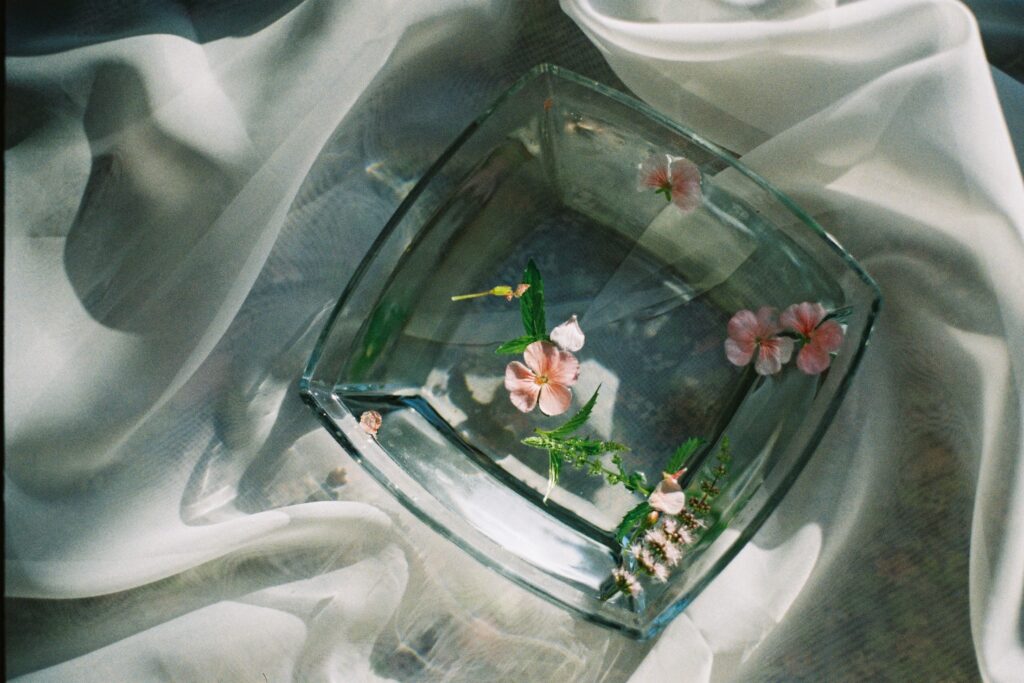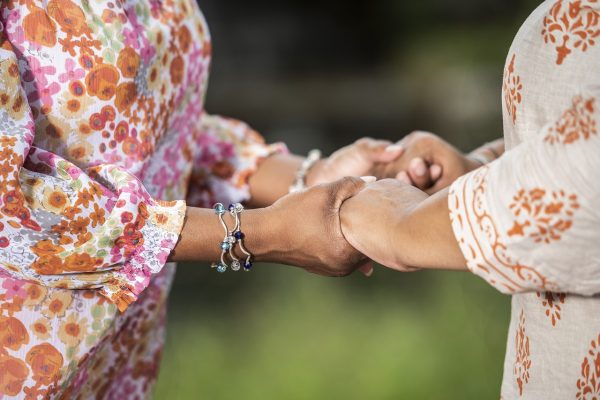This ritual could be done at Rosh Hodesh, the new moon festival according to the Jewish calendar. This is a women’s holiday, connecting women to the cycles of the moon and to the earth. She could either go to a body of water for this ritual or have two large bowls of water wherever she chooses. The first is for casting out, and the second is for purifying, or cleansing.
All:
Ufros Aleinu, sukat shlomekha. Or read in English: Spread over us the shelter of Your peace.
All:
Leader:
We gather today to acknowledge that an abortion has taken place and to transform the pain that is associated with that decision. We recognize that this was not an easy process and we are prepared to offer support to ___________.
Woman:
I come here today to commemorate a potential life and to affirm my decision to abort. This has not been an easy decision for the following reasons: (she elaborates)
[If woman has a partner, partner can speak to this as well: I also come to commemorate a potential life and to support my partner’s (and my own) decision to abort. This has not been an easy decision for the following reasons:]
Leader:
We recognize your pain in this decision and are here to help you move through this in the presence of your community.
Casting out
The first bowl of water is for tashlich (casting out). On Rosh Hashanah, the Jewish new year, it is customary to walk to the ocean, a river, creek, or lake with bread crumbs or any other substance which will dissolve or scatter in water. The crumbs symbolically represent our memories of painful decisions, troubling occurrences, or times in the past year when we feel we let ourselves or others down. It is taught that we must let these go at the High Holydays – it is psychologically unhealthy to hold on to them. During this process, participants still own their actions and decisions, but they come to a place of self-acceptance and peace with them.
If it is not possible to go to a body of water, this can be done with a large bowl of salt water. The woman should be encouraged to name aloud or silently whatever losses, internal feelings, or past actions she wishes to attach to the bread crumbs before casting them into the water. When they are immersed into the water, they start to dissolve, symbolizing that she has let those difficult experiences go, and can begin to move on.
After the crumbs have been cast, the woman may say:
Woman:
O merciful one, grant me the hope and courage I need to accept my decision to have an abortion. My tears, represented by the salt water, wash away my pain, and I am ready to move into a state of affirming my life, moving on from this difficult place.
Purification
The second bowl of water is for purification. Mikveh is the Hebrew term for ritual bath. A mikveh consists of mayim chayim, living waters, or natural waters. The living waters ritually and spiritually cleanse the body and ready it for renewal. Water, the fluid state, the agent of change, has the capacity to connect the physical with the spiritual. Immersion in the mikveh not only cleanses the soul but also renews the body. The act of completely immersing in a mikveh [either an actual ritual bath, or body of natural water], or symbolically cleansing the hands or feet with water, suggests a closure to this decision to abort. Mikveh literally means gathering. It can refer to a gathering of water or a gathering of time – the past and future brought together in the present. It also means hope, which is surely part of putting closure to the abortion by bathing oneself in hope for the future. (Susan Berrin, 1985)
Reader:
As water creates change, so women are often the agents of change. May we be witnesses today, not only to this transition, but also be witnesses to women as changemakers in our larger world. As water cleanses the spirit, may we be filled with renewal, with energy, power, and direction.
Using a cup, another participant can pour water over her hands and/or feet over the bowl of water.
The following prayer can be recited:
May the One who blessed our foremothers, Sarah, Rebecca, Rachel and Leah, bless, heal and renew _____________. May the Healer give her support and strength, patience of spirit and courage. May her pain and suffering now be alleviated and may she be thoroughly healed, in spirit and in body. Let the healing begin. Ana, El na, refa na la. “O God, pray heal her!” (Numbers 12:13)
OR:
All say:
May the One who shares sorrow with Your creation be with us now as we experience the loss of potential life. We are sad as we think of our hopes for this unborn one, as in our minds we imagine what might have been. Life is a fabric of different emotions and experiences. Now, while we experience life’s bitterness and pain, be with us and sustain us. Help us to gather strength from within ourselves, from each other, and from our friends. Blessed are You, O Divine Presence, who shares sorrow with Your creation. (Rebecca T. Alpert, Sh’ma, September 1985)
OR:
The woman, herself, may say:
Elohai n’shamah sh’natata bi t’horah hi.
Leader:
Woman [and partner] share why this has been a good decision.
We now share in a meal together. With this food, we help you affirm your life. By nourishing you in this difficult time, we let you know that we are here as support. We acknowledge that you made the best decision for your life at this time and honor your right to do so. We stand by you in times of hard decisions and are here to help you as representatives of your community. As Jewish women through the centuries have had to make hard decisions, we remind you of our chain of tradition. We urge you to find strength in it. We offer these foods to remind you that life – although at times bitter, salty, or sour – is also a mixture of sweetness. We appreciate the variety of tastes available to us from God’s universe and know that we would be deprived if all we tasted was sweetness. We offer these to you as nourishment – of all that life has to offer.












3 Responses
Thank you so much for sharing this powerful ritual. It is just what I needed to help me through.
Very informative.
Thankyou. Im going to go through one. This will help me heal.